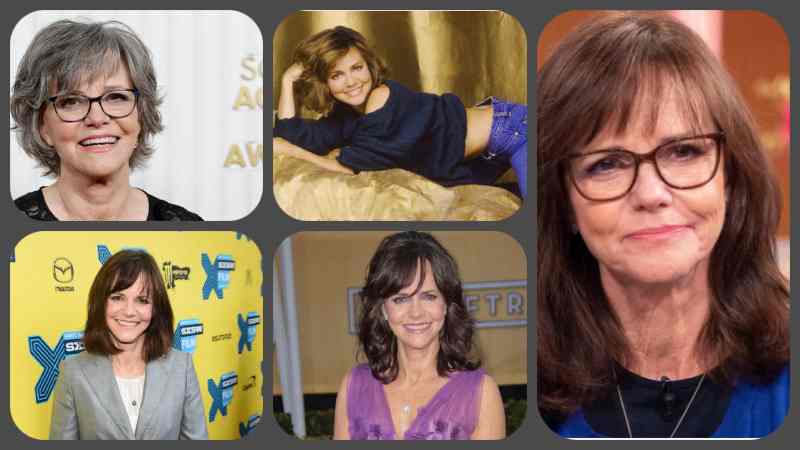Sally Field is a name that resonates with many, evoking images of iconic roles and powerful performances that have spanned decades. Whether it’s her emotional turn in Norma Rae, her breakout role in Gidget, or her unforgettable portrayal of a mother in Forrest Gump, Field has become one of Hollywood’s most respected and beloved actresses. Beyond her professional achievements, however, Sally Field’s life story is one of resilience, reinvention, and grace.
In this article, we will explore the various facets of Sally Field’s career, her personal life, and her enduring legacy in the entertainment industry.
Early Life and the Start of a Career
Sally Margaret Field was born in Pasadena, California on November 6, 1946. Her father, Richard Field, was a navy captain, and her mother, Margaret Field, was a screenwriter and actress. Despite the glamour of Hollywood, Sally’s childhood was marked by challenges. Her father, a World War II veteran, was distant and emotionally unavailable, and her mother struggled with mental health issues. These difficult circumstances shaped much of Field’s early life, and she has often spoken about how they influenced her as an actor and person.
Growing up in such an environment made Sally Field more self-reliant, giving her a deep emotion to draw upon in her acting. As a teenager, Field knew she wanted to pursue acting, and it wasn’t long before she found herself in front of the camera. Her first big break came in 1965 when she was cast as the lead in the popular TV series Gidget.
Gidget and the Birth of a Star
Gidget was a lighthearted show based on the 1959 film about a young girl who falls in love with surfing and becomes a quintessential “California girl.” Sally was only 18 years old when she landed the role of Gidget, and her portrayal of the teenage beach bum made her an instant TV star. The show ran for only one season (1965–1966), but it left a lasting impact on both Field and audiences.
Though Gidget was a comedic role, it marked the beginning of Sally Field’s ability to connect with audiences on a deeper level. Her genuine charm, relatable everywoman qualities, and natural comedic timing made her a beloved figure early on. However, despite her success in Gidget, Field found herself quickly pigeonholed into playing similar roles, something that frustrated her as she sought more depth and complexity in her work.
The Flying Nun and Struggles with Typecasting
After Gidget, Sally Field landed another popular TV series, The Flying Nun (1967–1970), where she played Sister Bertrille, a nun who could fly due to her lightweight habit and high spirits. The role was quirky and lighthearted, and while it earned Field fame and recognition, it also reinforced the idea of her being confined to roles that didn’t reflect her true range as an actress.
It wasn’t until the 1970s that Field began to break free from these typecasting struggles and move toward more serious and dramatic roles.
Breaking Through: Norma Rae and the Oscar Win
In 1979, Sally Field landed the role that would transform her career: Norma Rae. In this powerful film, she portrayed the title character, a factory worker in the South who becomes involved in a labor union movement. The film, directed by Martin Ritt, was based on the real-life story of a woman who fought to improve the working conditions of textile workers in North Carolina.
Field’s performance in Norma Rae was nothing short of transformative. She brought depth and authenticity to the role, and her portrayal of a woman standing up for what was right resonated with both critics and audiences. The film earned her the Academy Award for Best Actress, and it was a milestone not only in her career but in Hollywood’s perception of her talents.
Her acceptance speech at the Oscars is still remembered as one of the most touching and relatable moments in Academy Awards history. “I can’t deny the fact that you like me,” Field famously said, before elaborating on the overwhelming emotions she felt from being honored by her peers. It was a simple, heartfelt moment that connected with audiences and solidified her status as one of Hollywood’s most respected actresses.
The 1980s: From Comedy to Drama
After her success in Norma Rae, Field continued to build on her reputation as a versatile actress, moving between comedy and drama with ease. She starred in the 1984 film Places in the Heart, another role that would earn her a second Academy Award nomination. In this Southern drama, she portrayed a widow struggling to keep her farm afloat during the Great Depression.
Though she didn’t win the Oscar for Places in the Heart, Field’s performance was again widely praised. Her ability to convey vulnerability, strength, and resilience became a hallmark of her work. Sally was no longer just the “girl next door”—she had evolved into an actress capable of embodying complex and deeply emotional roles.
But it wasn’t just serious dramas that attracted Sally Field during the ’80s. She also embraced lighter fare, such as the popular Steel Magnolias (1989), where she starred alongside an ensemble cast of actresses including Dolly Parton, Julia Roberts, and Shirley MacLaine. The film, which revolved around a group of Southern women navigating life’s ups and downs, showcased Field’s ability to balance drama with humor, further cementing her status as a multi-dimensional performer.
Sally Field in the 1990s: A New Phase of Reinvention
As the ’90s rolled in, Sally Field found herself in a period of reinvention. She returned to television in the early part of the decade, appearing in several high-profile TV movies and miniseries. One notable project was The Long Way Home (1998), where Field played a woman who tried to reunite with her family during World War II.
In 1994, Field took on a role that would leave a lasting legacy in popular culture: she played Mrs. Gump in Forrest Gump, alongside Tom Hanks. Her portrayal of Forrest’s loving but stern mother resonated with audiences worldwide, and it helped further solidify her status as an actress capable of elevating any role she took on.
However, the 1990s were also a time when Field’s career took a backseat to her personal life. In interviews, she has spoken candidly about the challenges of balancing her career with her responsibilities as a mother. Field raised her sons, Peter and Eli while continuing to work in Hollywood, a delicate balancing act that many working mothers in the industry can relate to.
The 2000s and Beyond: A New Chapter
In the 2000s, Field began to embrace new forms of storytelling, including work in both television and film. One of her most memorable roles in this period was in the TV series Brothers & Sisters (2006–2011), where she played Nora Walker, the matriarch of a complex family. The series ran for five seasons, and Field’s performance as a woman navigating family drama, aging, and love earned her critical acclaim and several award nominations.
As Field entered her 60s, she continued to prove that age was no barrier to taking on exciting and meaningful roles. She appeared in films like Lincoln (2012), where she played Mary Todd Lincoln, the wife of the 16th president of the United States. Directed by Steven Spielberg and starring Daniel Day-Lewis, Lincoln was a critical and commercial success, and Field’s portrayal of Mary Todd was both poignant and powerful.
The Legacy of Sally Field
Sally Field’s career spans more than five decades, and her work has been marked by consistency in choosing roles that challenge her and allow her to explore different aspects of the human experience. Her body of work is diverse, ranging from dramatic roles to comedic turns, from television to film, but one thing has remained constant: her ability to connect with audiences.
What sets Sally Field apart from many of her peers is her authenticity. She’s always brought her full self to her roles, allowing her vulnerability, strength, and grace to shine through. She has often spoken about how she chooses roles based on the character’s depth and the emotional resonance of the story, not necessarily for fame or accolades.
Moreover, Field’s career is not just about the number of awards she’s won, but also about the meaningful contributions she’s made to the representation of women in film. Her work in Norma Rae helped bring attention to the labor movement, while her role in Places in the Heart highlighted themes of perseverance and survival in times of hardship. Through her roles, she has always been committed to portraying women in ways that feel honest, complex, and true to life.
Final Thoughts
Sally Field’s career is a testament to the power of resilience, authenticity, and reinvention. From her early days as the girl next door on TV to her Academy Award-winning performances, she has proven time and again that she is one of Hollywood’s finest actresses. But more than that, Sally Field is a woman who has embraced every phase of her life with grace and courage, and whose work continues to inspire new generations of fans and artists.
As we look back on Sally Field’s remarkable career, we can see that her greatest achievement isn’t just her award-winning performances, but the way she has touched our hearts through her portrayal of complex, relatable characters. She has become a symbol of acting excellence resilience, compassion, and the power of staying true to oneself.

